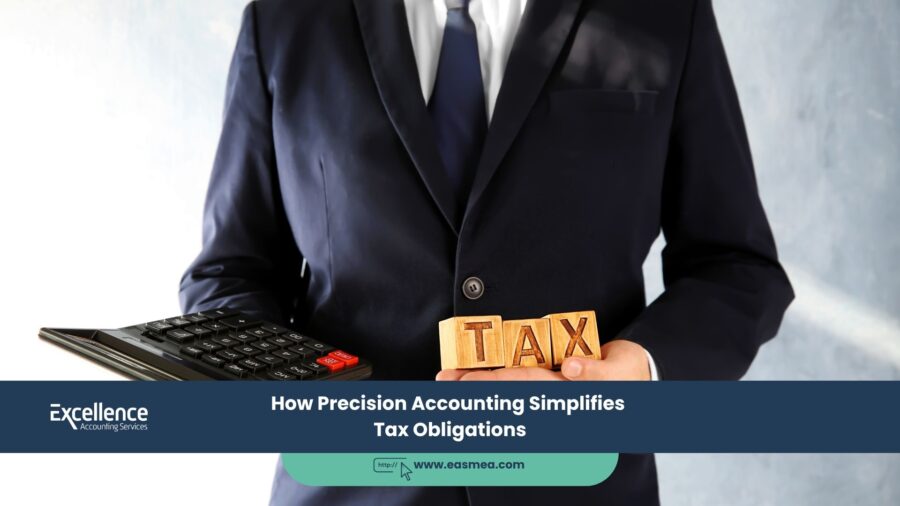How Precision Accounting Simplifies Tax Obligations
For many business owners in the UAE, the end of a tax period brings a familiar sense of dread. It’s a frantic scramble through shoeboxes of receipts, disorganized spreadsheets, and cryptic bank statements, all in a desperate attempt to piece together a compliant tax return. This chaotic, reactive approach to tax is not just stressful; it’s incredibly risky. In a sophisticated tax environment governed by the Federal Tax Authority (FTA), guesswork and approximation are invitations for audits, penalties, and financial leakage.
- How Precision Accounting Simplifies Tax Obligations
- Part 1: Defining Precision Accounting - Beyond Balancing the Books
- Part 2: Simplifying VAT Obligations with Precision
- Part 3: Simplifying Corporate Tax Obligations with Precision
- Part 4: The Role of Technology in Enabling Precision
- How Excellence Accounting Services (EAS) Delivers Precision
- Frequently Asked Questions (FAQs)
- Ready to Experience Financial Clarity?
There is, however, a better way. The secret to transforming tax compliance from a painful chore into a streamlined, strategic business function is not found in last-minute heroics but in a year-round commitment to one core discipline: precision accounting. Precision accounting is the practice of maintaining financial records with an unwavering focus on accuracy, detail, and compliance from the very first transaction. It’s the difference between having a vague map and a high-resolution GPS for your finances. This guide will explore how a culture of precision in your bookkeeping doesn’t just prepare you for tax season—it simplifies every aspect of your VAT and Corporate Tax obligations, turning compliance into a competitive advantage.
Key Takeaways on Precision Accounting and Tax Compliance
- Proactive, Not Reactive: Precision accounting categorizes transactions with tax implications in mind from day one, eliminating year-end guesswork.
- The CoA is the Blueprint: A detailed, tax-optimized Chart of Accounts is the foundation of precision accounting.
- Effortless VAT Filing: With precise records, calculating output tax and recoverable input tax for your VAT return becomes a simple, error-free process.
- Clear Path to Taxable Income: Precision creates an auditable trail from your accounting profit to your final Corporate Taxable Income, making adjustments clear and defensible.
- Audit Readiness is the Default State: When your books are precise, you are perpetually ready for an FTA audit, minimizing stress and risk.
Part 1: Defining Precision Accounting – Beyond Balancing the Books
Basic bookkeeping ensures your debits equal your credits. Precision accounting goes much deeper. It is a comprehensive approach defined by several key characteristics:
- Accuracy: Every transaction is recorded correctly, without errors, and reconciled against source documents like invoices and bank statements.
- Timeliness: Records are updated regularly (ideally daily or weekly), not just at the end of the month or quarter. This provides a real-time view of the business’s financial health.
- Granularity: Transactions are posted to highly specific accounts. “Office Expenses” is not enough; “Office Supplies,” “Software Subscriptions,” and “Printing & Stationery” provide the necessary detail.
- Compliance-Focused Categorization: Every entry is made with an awareness of its potential VAT and Corporate Tax treatment.
- Verifiability: Every entry in the ledger is supported by and linked to a source document (e.g., a tax invoice or receipt), creating an unshakeable audit trail.
This commitment to detail, managed through a robust accounting and bookkeeping process, is what transforms your financial records from a historical archive into a powerful compliance tool.
Part 2: Simplifying VAT Obligations with Precision
For many businesses, VAT is a constant, high-frequency compliance activity. Filing quarterly returns demands accurate data on every single sale and purchase. Imprecision here has immediate consequences.
A. Accurate Calculation of Output and Input Tax
A VAT return requires you to declare the total VAT collected on sales (Output Tax) and the total VAT you are eligible to reclaim on purchases (Input Tax). Precision accounting simplifies this dramatically:
- Output Tax: By using a dedicated sales ledger and issuing compliant tax invoices for every sale, the total output tax is automatically and accurately calculated by your accounting system. There’s no need to manually sift through invoices.
- Input Tax: This is where precision shines. With a detailed Chart of Accounts, VAT on expenses is categorized correctly upon entry. The system can instantly report the total VAT paid on, for example, ‘Raw Materials’ (fully recoverable) versus ‘Client Entertainment’ (non-recoverable for VAT). This prevents both under-claiming (losing money) and over-claiming (risking penalties).
The result is that a VAT return filing becomes a matter of running a report, reviewing the figures, and populating the VAT 201 form—a process that can take minutes instead of days.
B. Defending VAT Recovery Claims
The FTA is strict about input tax recovery. You must be able to prove that every dirham of VAT you claim relates to a legitimate business expense used for making taxable supplies, and that you hold a valid tax invoice. Precision accounting builds this defense automatically:
When you use software like Zoho Books to scan and attach a copy of the supplier’s tax invoice to the expense transaction, you create a direct, verifiable link. An auditor can click on any input tax claim in your VAT report and instantly see the supporting invoice, satisfying their query immediately.
Part 3: Simplifying Corporate Tax Obligations with Precision
If VAT is a sprint, Corporate Tax is a marathon. It looks at your entire financial year. The precision you maintain throughout the year culminates in a simplified and defensible annual tax return.
A. Creating a Clear Bridge from Accounting Profit to Taxable Income
Your Corporate Tax calculation starts with your net profit as per your financial statements. However, the law requires several adjustments to arrive at the final Taxable Income. A precise, tax-optimized Chart of Accounts is the key to making these adjustments transparent and simple.
Consider the “Entertainment” expense. The law states that client entertainment is only 50% deductible. With imprecise accounting, you’d have a single “Entertainment” account and spend days at year-end analyzing every single receipt to separate staff events from client lunches. With precision accounting, you have two accounts from day one:
- 6210 – Staff Entertainment (100% Deductible)
- 6220 – Client Entertainment (50% Deductible)
At year-end, the book-to-tax adjustment is simple: take the total of account 6220 and add 50% of it back to your profit. No analysis, no guesswork. The same logic applies to donations, fines, interest expenses, and other specific items. A thorough accounting review built on this structure makes the process seamless.
B. Justifying Transfer Pricing and Related Party Transactions
The FTA will closely scrutinize transactions between related parties to ensure they are at “arm’s length.” Precision accounting is your primary defense here. By maintaining separate, detailed accounts for all receivables, payables, revenues, and expenses with each related party, you create a clear record. This precise data is the foundation for your transfer pricing documentation, demonstrating to the authorities that your pricing is fair and justifiable, thereby avoiding penalties for non-compliance.
Part 4: The Role of Technology in Enabling Precision
Achieving and maintaining precision manually is nearly impossible in the modern business environment. Technology is the indispensable partner in this endeavor. Cloud accounting platforms are the engines of precision accounting.
A system like Zoho Books is designed for precision:
- Customizable Chart of Accounts: Allows you to build the granular, tax-optimized CoA that this guide recommends.
- Bank Feeds: Automatically imports bank transactions, ensuring nothing is missed and drastically simplifying account reconciliation.
- Receipt Management: Lets you capture and attach receipts to transactions digitally, creating that crucial audit trail.
- Automated Reporting: Generates accurate P&L, Balance Sheet, and tax summary reports instantly, based on your precise data.
Investing in the right accounting system implementation is investing in precision and, by extension, in simplified tax compliance.
How Excellence Accounting Services (EAS) Delivers Precision
Precision accounting isn’t just a concept; it’s a service we deliver. At EAS, we combine expert knowledge with leading technology to build and maintain a financial system for your business that makes tax compliance a simple byproduct of excellent bookkeeping.
- Expert Bookkeeping Services: Our professional accountants ensure every transaction is accurately categorized according to a tax-optimized Chart of Accounts, guaranteeing precision from the start.
- VAT & Corporate Tax Filing: We leverage your precisely-kept books to prepare and file your tax returns with unparalleled accuracy and efficiency, ensuring you meet every deadline and claim every legal deduction.
- Strategic CFO Services: We go beyond compliance, using the clear, precise data from your accounts to provide high-level CFO services that drive strategic decision-making.
- Internal Audit Services: Our internal audit processes review your financial controls and data integrity, ensuring that the precision in your books can stand up to any scrutiny.
Frequently Asked Questions (FAQs)
Standard bookkeeping focuses on recording transactions to produce basic financial statements. Precision accounting is a philosophy that treats every transaction as a potential data point for tax compliance and business intelligence. It involves more detailed categorization, regular reconciliations, and a forward-looking approach to compliance.
For optimal precision, bank accounts should be reconciled weekly, if not daily, using automated bank feeds. This ensures that discrepancies are caught immediately and that your cash position is always accurate. A full review of financial statements should be done at least monthly.
No. Software is a powerful tool, but it’s only as good as the data and the structure put into it. The correct setup of the Chart of Accounts and the consistent, knowledgeable application of accounting principles are essential. This is where professional accountants add critical value.
Auditors look for large, vague “miscellaneous” or “sundry” expense accounts, unreconciled bank accounts, a lack of supporting documentation for major expenses, and inconsistencies between your VAT returns and your annual financial statements. These all point to a lack of precision and invite deeper investigation.
Immensely. Banks and investors demand clean, accurate, and reliable financial statements. Precise accounting provides them with the confidence that your numbers are trustworthy, which significantly improves your credibility and your chances of securing financing or investment. Our business valuation services rely on this precision.
There is an initial investment in time and potentially professional fees to set up the system correctly. However, this cost is almost always offset by long-term savings from avoiding penalties, saving staff time, maximizing tax deductions, and making better business decisions based on accurate data.
It’s never too late. The first step is a “clean-up” project, where a professional accountant will go back through your historical records to organize, categorize, and reconcile them. Once a clean baseline is established, you can move forward with a precise system. It’s better to fix it now than to wait for an audit.
By recording invoices and payments in a timely manner, you always have an accurate, up-to-date picture of who owes you money (accounts receivable) and who you owe money to (accounts payable). This is critical for managing cash flow effectively, chasing late payments, and maintaining good relationships with suppliers.
Initially, there may be a learning curve. However, once the system and processes are in place, and especially when using modern accounting software, precision accounting actually *saves* time. It automates many tasks that were previously done manually and eliminates the hours or days spent on stressful, year-end clean-up and tax preparation.
The first step is to review your Chart of Accounts. Assess whether it has the necessary detail to handle the specific requirements of UAE VAT and Corporate Tax. If your expense list is generic and short, it’s a clear sign that you need to redesign it. This is the foundation upon which all other precision rests.
Conclusion: From Obligation to Opportunity
In the UAE’s evolving tax landscape, businesses can no longer afford to treat accounting as a backward-looking administrative task. Precision accounting redefines it as a forward-looking, strategic function. By embedding accuracy and tax-awareness into the DNA of your financial record-keeping, you fundamentally simplify your tax obligations. The anxiety of tax season is replaced by the confidence of compliance. The risk of penalties is replaced by the opportunity for optimized deductions. Ultimately, precision accounting provides the clarity needed not just to survive in a taxed world, but to thrive in it.




